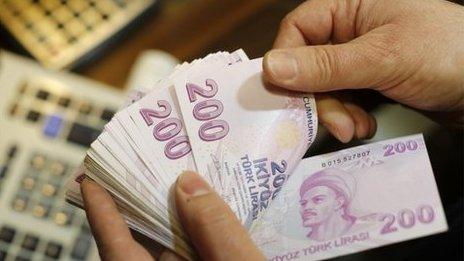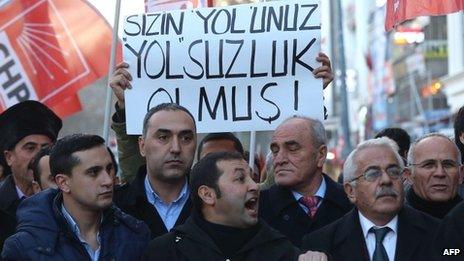Turkey's central bank calls emergency meeting over lira plunge
- Published

The lira has fallen against the euro and US dollar
The Turkish central bank has called an emergency meeting of its monetary policy committee for Tuesday, following a sharp fall in the lira against the euro and US dollar.
The bank said it would "discuss recent developments and take the necessary policy measures for price stability" at the meeting.
It will set out its plans in a statement at 22:00 GMT on Tuesday.
The move comes amid market pressure for the bank to raise interest rates.
After the announcement, the lira firmed to 2.3420 against the dollar, compared with a record low of 2.39 earlier in the day. But it fell 0.5% against the euro to 3.17740.
Reluctance
Just last week, the central bank decided to hold rates steady at its rate-setting meeting.
Analysts say the central bank is reluctant to raise rates for fear of slowing economic growth ahead of local elections due in March.
The government has forecast that Turkish growth will pick up from an expected rate of 3.6% in 2013 to 4% for this year, sharply down from the 8% growth it achieved in both 2010 and 2011.
Turkish markets have been hit by an investigation into public sector corruption involving the construction industry.

The allegations have prompted demonstrations - the poster reads "corruption is your way"
The probe, which came to light in December, saw three ministers resign and prompted a cabinet reshuffle.
The bank last held an emergency meeting in 2011, when it decided to cut its main policy rate to 5.75% from 6.25%.
'Most vulnerable'
Economists at Capital Economics warned that market turbulence in emerging markets including Turkey had led to talk of a "new crisis".
It cited Turkey among a list of countries which it said would be the "most vulnerable" to the Federal Reserve's decision in December to slow down the rate of its asset purchases from $85bn to $75bn a month.
The US central bank has been running a stimulus programme, known as quantitative easing, aimed at boosting its economy following the global financial crisis.
As the US scales back the programme, investors could pull out of emerging markets, resulting in a further fall in stocks and currencies in those economies.
- Published21 January 2014
- Published18 January 2014
- Published15 January 2014
- Published10 January 2014